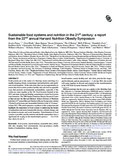| dc.contributor.author | Fanzo, Jessica | |
| dc.contributor.author | Rudie, Coral | |
| dc.contributor.author | Sigman, Iman | |
| dc.contributor.author | Grinspoon, Steven | |
| dc.contributor.author | Benton, Tim G. | |
| dc.contributor.author | Brown, Molly E. | |
| dc.contributor.author | Covic, Namukolo | |
| dc.contributor.author | Fitch, Kathleen | |
| dc.contributor.author | Golden, Christopher D. | |
| dc.contributor.author | Grace, Delia | |
| dc.contributor.author | Hivert, Marie-France | |
| dc.contributor.author | Huybers, Peter | |
| dc.contributor.author | Jaacks, Lindsay M. | |
| dc.contributor.author | Masters, William A. | |
| dc.contributor.author | Nisbett, Nicholas | |
| dc.contributor.author | Richardson, Ruth A. | |
| dc.contributor.author | Singleton, Chelsea R. | |
| dc.contributor.author | Webb, Patrick | |
| dc.contributor.author | Willett, Walter C. | |
| dc.date.accessioned | 2022-07-14T15:04:51Z | |
| dc.date.available | 2022-07-14T15:04:51Z | |
| dc.date.issued | 2021-11-09 | |
| dc.identifier.citation | Fanzo, j. et al (2022) 'Sustainable Food Systems and Nutrition in the 21st Century: a Report from the 22nd Annual Harvard Nutrition Obesity Symposium', The American Journal of Clinical Nutrition 115.1: 18–33, DOI: 10.1093/ajcn/nqab315 | en |
| dc.identifier.uri | https://opendocs.ids.ac.uk/opendocs/handle/20.500.12413/17531 | |
| dc.description.abstract | Food systems are at the center of a brewing storm consisting of a rapidly changing climate, rising hunger and malnutrition, and significant social inequities. At the same time, there are vast opportunities to ensure that food systems produce healthy and safe food in equitable ways that promote environmental sustainability, especially if the world can come together at the UN Food Systems Summit in late 2021 and make strong and binding commitments toward food system transformation. The NIH-funded Nutrition Obesity Research Center at Harvard and the Harvard Medical School Division of Nutrition held their 22nd annual Harvard Nutrition Obesity Symposium entitled “Global Food Systems and Sustainable Nutrition in the 21st Century” in June 2021. This article presents a synthesis of this symposium and highlights the importance of food systems to addressing the burden of malnutrition and noncommunicable diseases, climate change, and the related economic and social inequities. Transformation of food systems is possible, and the nutrition and health communities have a significant role to play in this transformative process. | en |
| dc.language.iso | en_US | en |
| dc.publisher | Oxford University Press | en |
| dc.relation.ispartofseries | The American Journal of Clinical Nutrition;115.1 | |
| dc.rights.uri | http://creativecommons.org/licenses/by-nc/4.0/ | en |
| dc.subject | Nutrition | en |
| dc.title | Sustainable Food Systems and Nutrition in the 21st Century: a Report from the 22nd Annual Harvard Nutrition Obesity Symposium | en |
| dc.type | Article | en |
| dc.rights.holder | © The Author(s) 2021. Published by Oxford University Press on behalf of the American Society for Nutrition. | en |
| dc.identifier.externaluri | https://doi.org/10.1093/ajcn/nqab315 | en |
| dc.identifier.team | Health and Nutrition | en |
| dc.identifier.doi | 10.1093/ajcn/nqab315 | |
| dcterms.dateAccepted | 2021-09-10 | |
| rioxxterms.funder | Default funder | en |
| rioxxterms.identifier.project | Default project | en |
| rioxxterms.version | VoR | en |
| rioxxterms.versionofrecord | 10.1093/ajcn/nqab315 | en |
| rioxxterms.funder.project | 9ce4e4dc-26e9-4d78-96e9-15e4dcac0642 | en |


